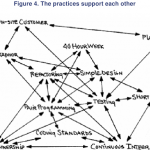Cognitive Bias in Artificial Intelligence
I believe that artificial intelligence will suffer from cognitive biases, just as humans do. They might be altogether different kinds of bias, I won’t speculate about the details. I came to this conclusion by reading “Thinking Fast and Slow” by…
Cognition and Linguistics
I see the study and development of computer languages as two sides of the same coin. A computer language should enable the programmer to express, clearly and concisely, an algorithmic intent. It should not burden the programmer with a particular…
Why Grading Sucks
It’s not just that the student provided solutions are unexpectedly “creative” and don’t fit the designed rubric. Nor that they make you wonder “Why am I even trying?”. Nor that they invoke thoughts such as “How did we ever make…
Don’t Fear the Mistakes
During teaching, there is a fascinating (and unfortunately common) problem: Students are VERY reluctant to suggest an answer, for fear that they might be wrong. Salman Kahn, noticed this phenomenon after he started doing videos for his niece and nephew:…
Expert Tutors
Carl Wieman (who won a Nobel for deepening our understanding of Bose-Einstein condensation) lays out some of the important findings and methodology in his talk “Science Education in the 21st Century: Using the Tools of Science to Teach Science“. In…
Using Science to Teach Science
I’ve recently absorbed American RadioWorks feature on “Tomorrow’s College“. Especially interesting was the program “Don’t Lecture Me, where the story of some physicists gathered data about the learning and understand of their students, only to discover that the traditional lecture…

eXtreme Education: Cognitive programming
I read a few articles that I’d like to pull together and place under the growing umbrella of what might probably become my personal teaching philosophy. First, when you look at eXtreme Programming, it consists of a collection of reinforcing…
Minds from Agents
Recently, I came across this SEED article, Divide Midns, Specious Souls; which has this deliciously anti-religious, pro-science quote: Within the wide range of works arranged along the axis of soulism, from Life After Death: The Evidence, by Dinesh D’Souza, to…
Building Linguistic Structure
Yesterday, I had an interesting thought. My advisor once made the cultural observation that many people in Computer Science invent their own language and then immediately write a self-hosting compiler. I agree that a compiler is quite a feat of…
Thinking about Thinking
So far, in my reading of Minsky’s Society of Mind, his hypothesis, that the mind is an agglomeration of specialized agents working in conjunction with each other completely meshes with observations of my own behavior. In particular, I’ve noticed that…
